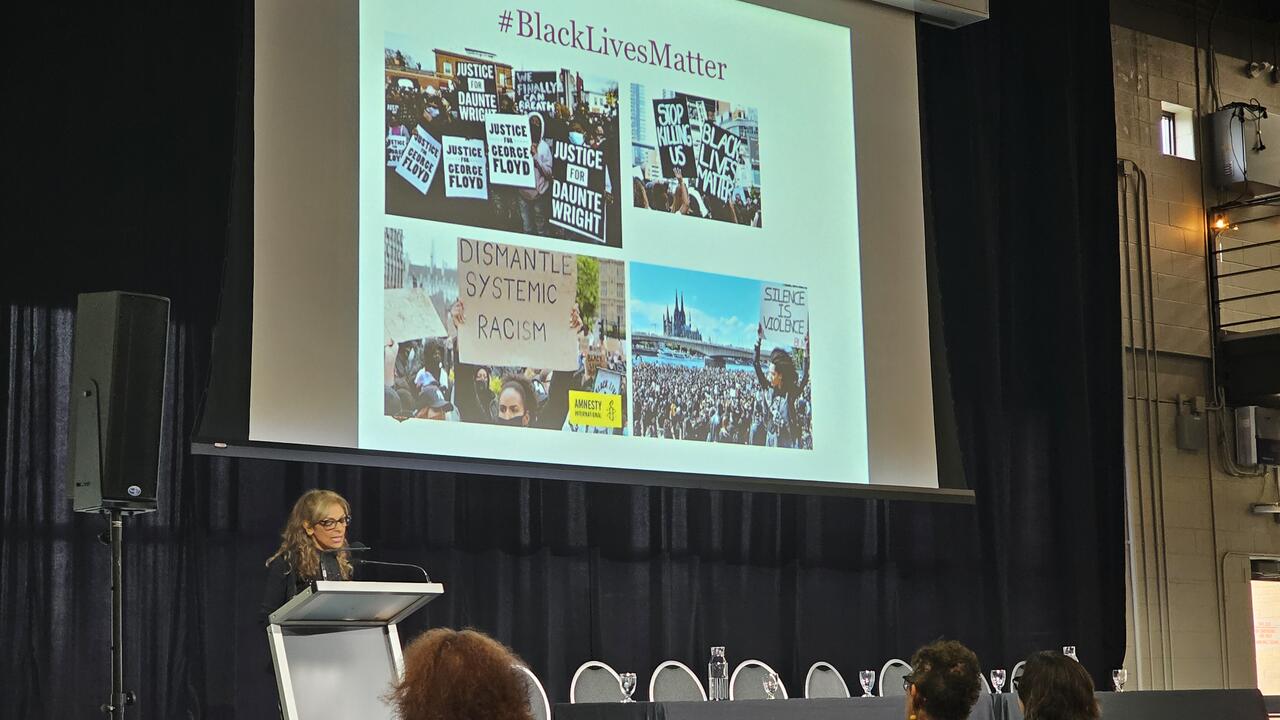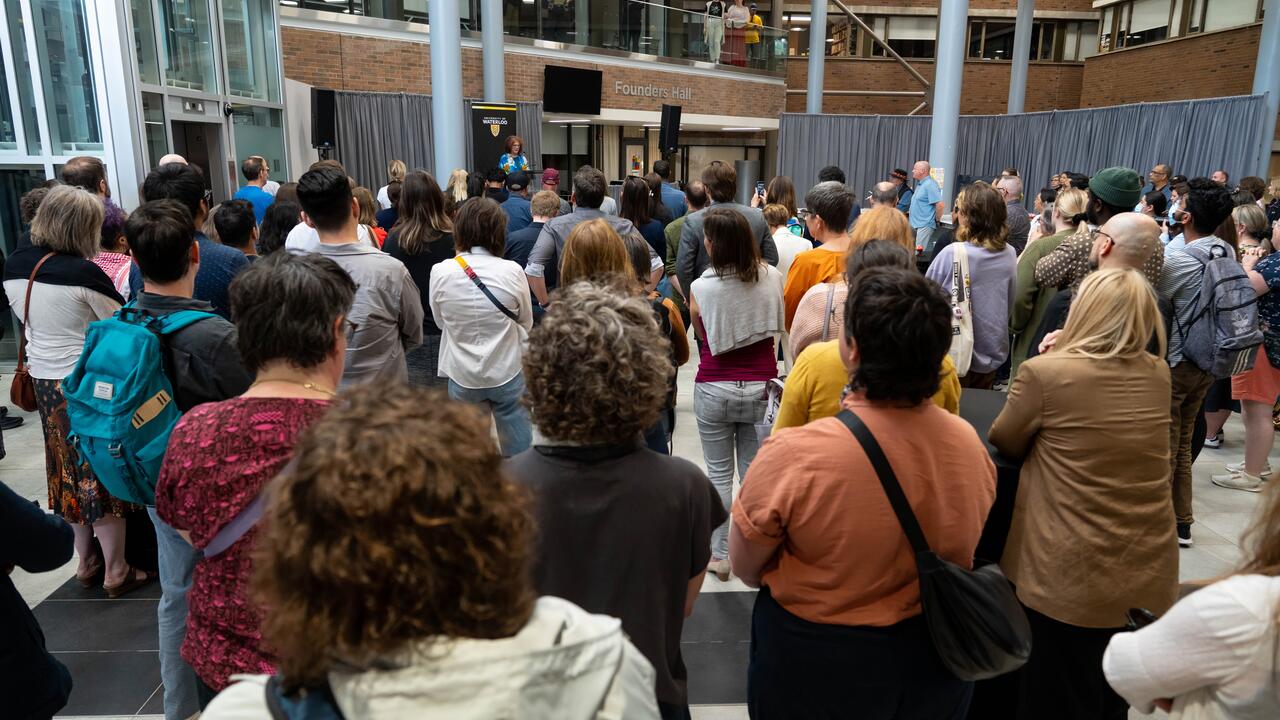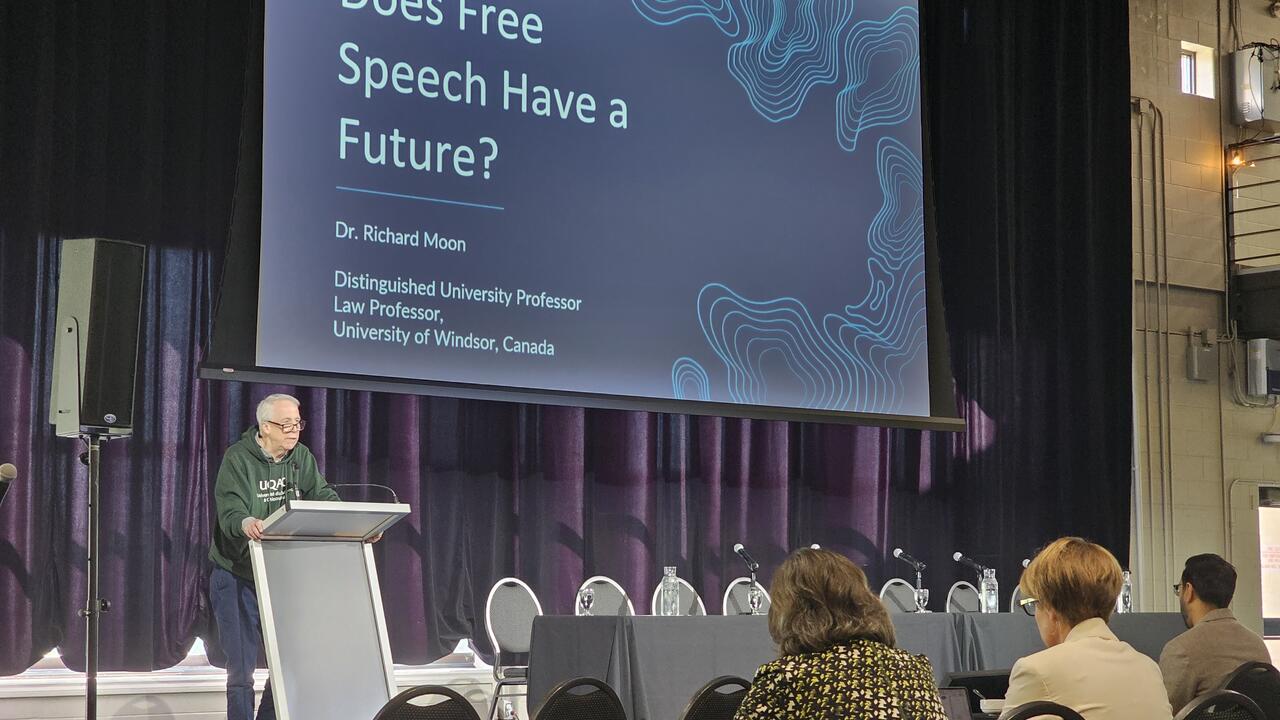
Overcoming fear for social justice
One year after Hagey Hall attack, Waterloo hosted an international conference to explore ways of promoting trust and understanding in academia

One year after Hagey Hall attack, Waterloo hosted an international conference to explore ways of promoting trust and understanding in academia
By University RelationsWaterloo researchers are renowned for challenging perspectives in their pursuit of truth and to produce knowledge that leads to transformative solutions for humanity to thrive in a complex future.
Although universities are environments where new ideas and discoveries are cultivated, and a space for curiosity to flourish, researchers in many fields also experience hostile responses to their work.
On June 28, 2023, members of the Waterloo community experienced a hate-motivated attack in a gender and social justice class. The horrific impact of the attack is expected to linger for some time, which prompted members of the University community to ask: “Why is this happening and what can we do about it?”
This question led to a collaboration between the Office of Research, the Faculty of Arts and the Provost Office to host a four-part speaker series titled Antagonism and Intimidation in Academia. The speaker series recently culminated with a two-day international conference that broadly focused on the subject of responding to antagonistic and intimidating reactions to academic research and pedagogy. More than 180 registrants and 48 local, national and international speakers participated in the event.
“Researchers need the freedom to investigate challenging ideas, push boundaries and question the status quo. This is how innovation happens,” said Dr. Charmaine Dean, vice-president of Research and International, during her opening remarks. “Both the speaker series and international conference have offered the community important venues for exploring new approaches to building trust in the academy.”
Dr. Sheila Ager, dean of the Faculty of Arts, added that in the weeks following the attack, University-wide townhalls provided the opportunity to hear from students and researchers the lack of inclusion and antagonism they felt. “We all know that self-reflection is good for individuals and for institutions, but such reflection should ideally result in action,” she said. “The speaker series and this conference were inspired by what we heard, and we wanted you all to bring your scholarly expertise to these challenging and often frightening and painful questions.”
Dr. Kalwant Bhopal, professor of education and social justice at the University of Birmingham delivered a keynote lecture on the first day that examined how Black and other racialized staff and students remain marginalized in higher education. By drawing on empirical research of the response to the Black Lives Matter movement in the wake of George Floyd’s murder, the lecture explored how processes of whiteness and white privilege work to perpetuate the white space of higher education.

Dr. Kalwant Bhopal during her keynote lecture on the first day of the conference.
“Racism is ordinary … it's not aberration,” she said. “It's the usual way that society does business. It's the common everyday experiences of most people of colour in the U.K., the U.S., and indeed, the world. And that’s why critical race theory and the teaching of white privilege has already been banned in 32 U.S. states, while many others are currently considering banning it.”
To underscore how white spaces of higher education are perpetuated, Bhopal shared that in many cases, race is only addressed during specific historical moments, such as the tragic murder of George Floyd. In this way, she said, “Race is silenced and it's re-silenced. Race is weaponized.” Therefore, “a failure to acknowledge racism leads to a failure to address racism.”

More than 150 campus members gathered inside the Hagey Hall Hub on June 28, during a break from the conference, in solidarity and support of everyone who had to confront violence and experience trauma during the hate-motivated attack one year earlier.
On the second day, Dr. Richard Moon, distinguished university professor of law at the University of Windsor, delivered a keynote address on the future of free speech. His talk centred around how social media have contributed to a new set of speech harms or risks, while at the same time making the regulation of harmful speech more difficult. “Forms of speech that in the past may not have been regarded as sufficiently harmful to justify their legal restriction, have become more harmful or dangerous in the online world,” he said. “The principal threat to public discourse may no longer be censorship, and state censorship in particular, but rather the spread of disinformation.”
Further, in acknowledging the very polarizing times we are living in, with protests across university campuses in Canada and social unrest around the world, Moon emphasized that “we do not need to reach agreement on all important public issues, but we do need to be able to converse with one another on these matters in a way that recognizes that we are all participants in a common political project.”

Dr. Richard Moon during his keynote address on the second day of the conference.
The conference covered themes such as racialization, gender and sexual struggles, human rights, discrimination and exclusions, histories of harm, and responses that are directed at those engaged in social justice scholarship. It also highlighted questions of the future of freedom of expression, academic freedom, hate speech, and workplace democracy.
Dr. Suzan Ilcan, University Research Chair and special advisor on interdisciplinary research at the University of Waterloo, was the lead conference organizer and shared, “Alongside these themes, much discussion focussed on building communities of care, creating solidarity to challenge assaults on critical thought in neoliberal, far-right-wing, and authoritarian climates, and producing safe spaces of sharing, repairing, caring, trusting, and understanding.”

Read more
The second in the series centred a dialogue on antagonistic responses to science and technology

Read more
Researchers share what motivates them to continue their work despite harsh scrutiny and misinformation

Read more
Inaugural talk opens the conversation on gender and race in academic research and pedagogy
The University of Waterloo acknowledges that much of our work takes place on the traditional territory of the Neutral, Anishinaabeg, and Haudenosaunee peoples. Our main campus is situated on the Haldimand Tract, the land granted to the Six Nations that includes six miles on each side of the Grand River. Our active work toward reconciliation takes place across our campuses through research, learning, teaching, and community building, and is co-ordinated within the Office of Indigenous Relations.